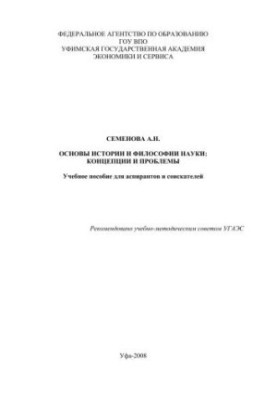Foundations of the history and philosophy of science: concepts and problems
 Instant download
Instant download
after payment (24/7)
 Wide range of formats
Wide range of formats
(for all gadgets)
 Full book
Full book
(including for Apple and Android)
"Fundamentals of the History and Philosophy of Science: Concepts and Problems" by A. N. Semenova is a fascinating and in-depth study that opens the world of scientific knowledge and its philosophical foundations to the reader. In this work, the author not only expounds facts and theories, but also immerses the reader in the context of the historical development of science, raising important questions about how scientific concepts were formed and what problems they generated over the centuries. Semenov, known for his work in the philosophy of science, offers readers a unique perspective on the interaction of science and philosophy. He examines how historical events, cultural changes, and social factors influenced the development of scientific ideas. The book will be of interest to both undergraduate and graduate students studying philosophy, the history of science and related disciplines, and a wide audience that seeks to understand how science shapes our perception of the world. One of the key topics of the book is the analysis of scientific revolutions and their impact on society. Semenov explores how new scientific discoveries have changed not only ideas about nature, but also social structures, ethical norms and philosophical concepts. Readers will be able to see how the ideas of such great scientists as Galileo Galilei, Isaac Newton and Albert Einstein not only changed the science itself, but also influenced the philosophical debate about the nature of reality and knowledge. The book also raises important questions about the boundaries of science and philosophy. Semenov discusses where the scientific explanation ends and philosophical understanding begins This makes the work especially valuable for those who are interested not only in facts, but also in deep reflections on the place of science in our lives. Questions about how science can serve as a tool for solving social and ethical problems are also reflected in the text, which makes it relevant in the modern world. The author's style is clear and accessible, which allows even those who do not have deep knowledge in the field of philosophy or science to easily follow his thoughts. Semenov uses many examples and historical illustrations, which makes reading not only informative, but also fascinating. His ability to connect theoretical concepts with real events and personalities makes the book lively and interesting. If you are interested in topics such as the philosophy of science, the history of scientific discovery, or just want to better understand how science interacts with society and culture, then “Fundamentals of the history and philosophy of science: concepts and problems” will be a real find for you. This book will not only expand your horizons, but also make you think about how science shapes our perception of the world and what challenges it faces in the future. Thus, “Fundamentals of the History and Philosophy of Science: Concepts and Problems” is not just a textbook, but a real intellectual odyssey that inspires reflection and discussion. Readers looking for deep and meaningful texts about science and philosophy will find much interesting and useful in this work. Do not miss the opportunity to immerse yourself in the world of ideas that shape our understanding of science and its role in society.
LF/300821504/R
Data sheet
- Name of the Author
- А. Н.
Семенова - Language
- Russian
- ISBN
- 9785884693807



























